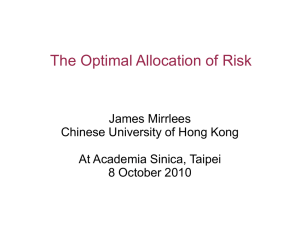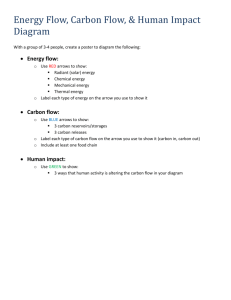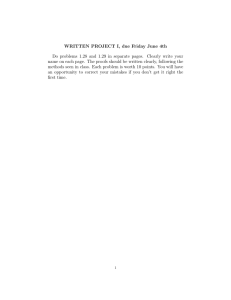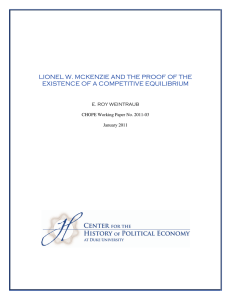Erasmus Journal for Philosophy and Economics, Volume 8, Issue 1,
advertisement
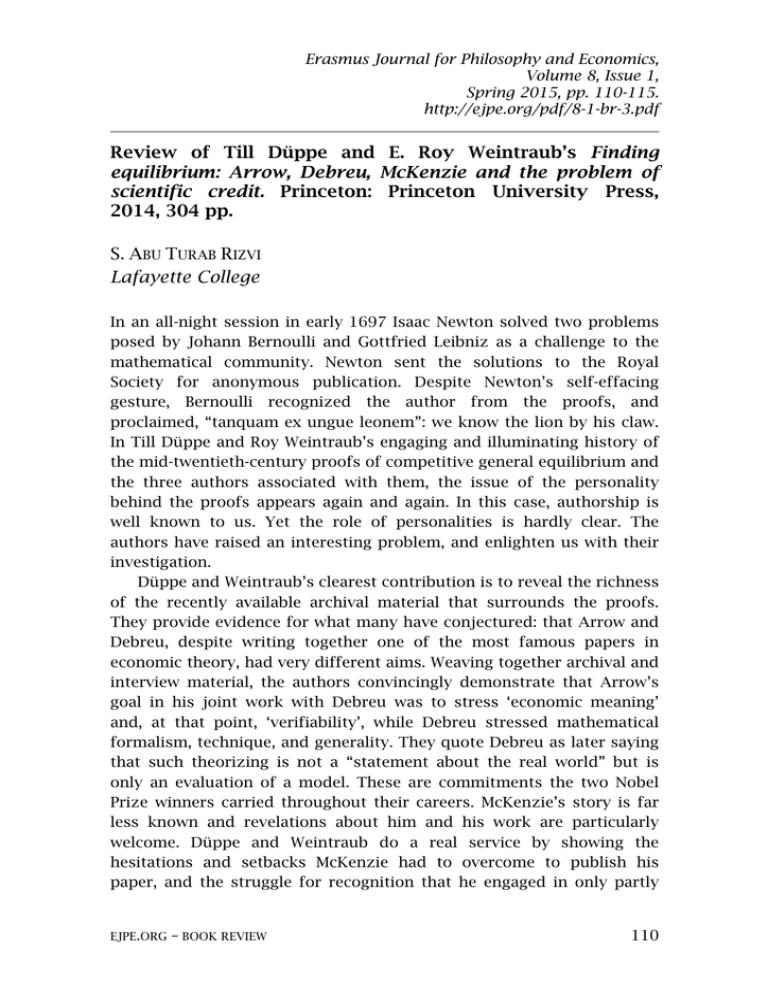
Erasmus Journal for Philosophy and Economics, Volume 8, Issue 1, Spring 2015, pp. 110-115. http://ejpe.org/pdf/8-1-br-3.pdf Review of Till Düppe and E. Roy Weintraub’s Finding equilibrium: Arrow, Debreu, McKenzie and the problem of scientific credit. Princeton: Princeton University Press, 2014, 304 pp. S. ABU TURAB RIZVI Lafayette College In an all-night session in early 1697 Isaac Newton solved two problems posed by Johann Bernoulli and Gottfried Leibniz as a challenge to the mathematical community. Newton sent the solutions to the Royal Society for anonymous publication. Despite Newton’s self-effacing gesture, Bernoulli recognized the author from the proofs, and proclaimed, “tanquam ex ungue leonem”: we know the lion by his claw. In Till Düppe and Roy Weintraub’s engaging and illuminating history of the mid-twentieth-century proofs of competitive general equilibrium and the three authors associated with them, the issue of the personality behind the proofs appears again and again. In this case, authorship is well known to us. Yet the role of personalities is hardly clear. The authors have raised an interesting problem, and enlighten us with their investigation. Düppe and Weintraub’s clearest contribution is to reveal the richness of the recently available archival material that surrounds the proofs. They provide evidence for what many have conjectured: that Arrow and Debreu, despite writing together one of the most famous papers in economic theory, had very different aims. Weaving together archival and interview material, the authors convincingly demonstrate that Arrow’s goal in his joint work with Debreu was to stress ‘economic meaning’ and, at that point, ‘verifiability’, while Debreu stressed mathematical formalism, technique, and generality. They quote Debreu as later saying that such theorizing is not a “statement about the real world” but is only an evaluation of a model. These are commitments the two Nobel Prize winners carried throughout their careers. McKenzie’s story is far less known and revelations about him and his work are particularly welcome. Düppe and Weintraub do a real service by showing the hesitations and setbacks McKenzie had to overcome to publish his paper, and the struggle for recognition that he engaged in only partly EJPE.ORG – BOOK REVIEW 110 FINDING EQUILIBRIUM / BOOK REVIEW successfully. Düppe and Weintraub relate numerous pertinent and illuminating facts, events, and conversations that surround these authors and the circles in which they traveled. The authors’ methodological points will be more controversial than their expansion of the historical record. I will focus on three claims regarding the personality of authors and their work. The first derives from the Mertonian observation that science aims for impersonal authoritativeness, yet credit for scientific discoveries is perforce personal. This sets up a tension that our protagonists have to address. Should they maneuver to gain credit or simply be pleased by their contributions to the advancement of an overarching enterprise? Arrow is the clearest exponent of the anonymity and sociality of the enterprise. He writes that economic research is “more and more a cooperative matter, requiring teams of individuals trained along similar lines”. He says of the proof, “If I had not done it, somebody else would have” (p. 235). Düppe and Weintraub show that while Arrow tended toward this self-effacing position, Debreu and McKenzie, confidentially but persistently, hungered for the recognition and respect that comes from priority in publication—credit for work, appointments and recognitions at prestigious institutions, and prizes for a lifetime of achievement, most notably the Nobel Prize. Düppe and Weintraub are successful at showing us the tensions that arise between the norms of science and personal ambition. As with Newton, personality seems hard to stamp out. If a claw can be seen, it denotes a lion, not a mere mortal. The authors take Arrow’s attitude at face value. They write that in contrast to the backbiting of Debreu in his priority battle with McKenzie, “Arrow, instead, remained generous” (p. 212). Arrow may well have displayed such characteristics regardless of circumstance, but it is fair to point out that he got recognitions that others may have deserved, and got them more easily and earlier than the other two. From this more doubting perspective, it is possible to see Arrow’s magnanimity as something he could afford to display. Similarly, McKenzie and Debreu’s circumstances may have propelled them into more decisive action to advance their cases. Debreu was awarded the Nobel Prize eleven years after Arrow and had been denied tenure at Yale to boot; McKenzie suffered through a failed D.Phil. at Oxford, a sense of isolation and provincialism, and no Nobel Prize even though he had publication priority. That is, it may be that the record shows more what psychologists would call ‘state’ rather than ‘trait’. ERASMUS JOURNAL FOR PHILOSOPHY AND ECONOMICS 111 FINDING EQUILIBRIUM / BOOK REVIEW Nonetheless, Düppe and Weintraub do choose a side and make the claim that, pace Merton, it is primarily personality factors rather than the norms of science—‘social forces’ is their term—that result in battles for priority and credit (p. 240). Yet it is hard to disengage the two. They themselves point to institutional factors as being dominant in McKenzie’s case, who was “acutely aware of his professional marginalization” and argue that he got less of a hearing because of his intellectual pedigree and institutional affiliation, for being an “academic outsider” (pp. 241-242). This conservatism of the economics profession contrasts with Martin Shubik’s description of the atmosphere of the Princeton mathematics department, in which “[i]f a stray ten-year-old with bare feet, no tie, torn blue jeans, and an interesting theorem had walked into Fine Hall at tea time, someone would have listened” (pp. 9495). McKenzie, and Debreu earlier on, had a much harder time getting someone to listen. Thus Düppe and Weintraub’s claim that as a general rule it is more personality and less social norms at work seems hard to sustain. In fact, read more generously than their statement about Merton would suggest, we can see the authors arguing for a more complex causality or, as they term it, a mutual or reciprocal stabilization of the antagonistic demands of personality and work. Arrow, Debreu, and McKenzie struggled to produce work that was valued by the communities in which they found themselves without contravening important personal considerations, which were themselves molded by circumstance. This is why Düppe and Weintraub spend considerable space on the contexts of the work, exploring the activities of the RAND Corporation, the Cowles Commission, mathematics departments at Princeton and Chicago, and the like. A second aim of Düppe and Weintraub is to repersonalize (p. xv) and depersonalize (p. xiii) economic theory at the same time. If this sounds complicated, it is, and the authors note the “apparent paradox” (p. xiii). But they have a coherent position. While they do want to repersonalize the equilibrium proofs, which means that we see the personalities behind them, they want to maintain the overall impersonality aspired to by economic theory as a science. They try to have it both ways. Here is how they are able to argue in this manner. They “seek to understand the peculiar human practice of economic theory by viewing it less as a way of representing the world than as a way of dealing with the world” (p. xxi). What they mean is that economic theory is not about the world, about the economy, but is instead about models and the VOLUME 8, ISSUE 1, SPRING 2015 112 FINDING EQUILIBRIUM / BOOK REVIEW academic communities in which they make sense. Thus personal commitments about the world or the economy do not enter into consideration. On the other hand, personality and career allow the theorist to deal with the life of being an economist: thus matters like credit, prestige, priority, acceptance, preferment, influence, and the like figure very strongly in their account. These are worldly, social matters the theorist has to navigate. To repersonalize economics means to bring to the fore such career concerns. Here, too, the situation is more complicated. They several times mention Debreu’s view that the theorist deals with models, not with the economy. They also point out that modern economic theory differs from personality-laden schools, such as those associated with Schumpeter, Keynes, or Hayek, each of whom had a particular economic vision. Thus the economic theorist cares about a career, not about the economy, cares about the narrow world of personal ambition in a closed community, not about influence in the real world. The problem with this view is not that it is insular, verging on gossip and anecdote, but that it does not jibe with the view of one of the main protagonists. Arrow always felt that an economic theorist should deal with the world. After all, Arrow’s case is a continuing contrast to Debreu that Düppe and Weintraub illuminate so well (e.g., pp. 196-203). (McKenzie does not say nearly as much as the other two about method and approach.) Arrow seems to have thought (mistakenly) that the models resulting in the proofs of the existence of competitive equilibrium could be modified to bring them into closer relation to the real world and that such developments would allow for the model’s use and relevance. This is true as of the 1971 writing of General competitive analysis, Arrow’s treatise with Frank Hahn, which tried to extend the basic proofs to debt, bankruptcies, imperfect competition, uniqueness and stability analysis, econometric identification, comparative statics, and Keynesian economics. It is fair to say that Arrow’s hopes were dashed by the Sonnenschein-Mantel- Debreu results published in the following several years that showed that the competitive model had no particular implications at the aggregate level. Thus, Arrow had particular ambitions for the proofs of the 1950s to be relevant in ways that it turned out they could not be: he says in 1986 that the hypothesis of rationality had few implications at the aggregate level (Rizvi 2006, 232). His personal commitments notwithstanding, he had not understood that the deep mathematical structure of the model ERASMUS JOURNAL FOR PHILOSOPHY AND ECONOMICS 113 FINDING EQUILIBRIUM / BOOK REVIEW would not allow for its elaboration along hoped-for lines, something that always seemed to have been clear to Debreu, as Düppe and Weintraub point out well (and was implied by the unheralded Hirofumi Uzawa 1962). While the authors seek to understand economic theory as less “representing the world than as a way of dealing with” it, Arrow, in his own words, wants to be a more “complete economist” and sees his economics as deriving from a “social conscience”, since “when we talk about studying people, we also talk about advising them” (p. 201). Thus he wants not just to deal with the world, but to represent it and intervene in it. A third position follows from Düppe and Weintraub’s view that economic theory deals with models, not with personal (non-career) goals and visions for the use of economics in the world. This allows the claim that economic theory is universal, ‘authoritative’ in Düppe and Weintraub’s phrase, and not tied to particular visions. The analogy is with natural science. If science is discovery about nature, the personality or individuality of the discoverer is irrelevant. The authors contrast this view with the “differentiated collection of Marxian, Keynesian, neoclassical, Marshallian, Ricardian, Institutionalist, Austrian (and so forth) economists” who are particular and whose views bear an originator’s ‘personal stamp’ (p. xiii). They support their view by quoting Debreu who says that, “Even though a mathematical economist may write a great deal, it usually remains impossible to make, from his works, a reliable conjecture about his personality” (p. xiii). But, as we have seen, personality means much more than behavioral traits. When it entails political and economic commitments, these might be discernible in mathematical economic theory. Düppe and Weintraub’s argument for the contrary is that it made sense to depoliticize economics in order to escape McCarthyite scrutiny (pp. 81-82). This stratagem does not explain the depoliticized nature of economics thereafter. There has to be more to the story. One wishes that Düppe and Weintraub had supported their view further. After all, it is quite a trick for one particular brand of economics to end up having the anonymity and universality of science, while its competitors are seen as personal and particular. REFERENCES Rizvi, S. Abu Turab. 2006. The Sonnenschein-Mantel-Debreu results after thirty years. History of Political Economy, 38 (1): 228-245. VOLUME 8, ISSUE 1, SPRING 2015 114 FINDING EQUILIBRIUM / BOOK REVIEW Uzawa, H. 1962. Walras’ existence theorem and Brouwer’s fixed point theorem. Economic Studies Quarterly, 13 (1): 59-62. Abu Rizvi studies the methods and history of microeconomics. He has written in particular about the theories of games and general equilibrium. A book, co-authored with David Levine, Poverty, work and freedom: political economy and the moral order, explores another area of interest. He is provost and professor of economics at Lafayette College. Contact e-mail: <rizvia@lafayette.edu> ERASMUS JOURNAL FOR PHILOSOPHY AND ECONOMICS 115
